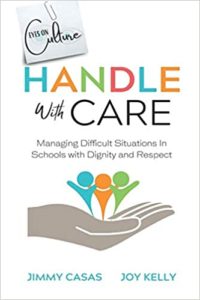Building School Cultures That Support Us All
Handle with Care: Managing Difficult Situations in Schools with Dignity and Respect
By Jimmy Casas and Joy Kelly
(ConnectEDD Publications, March 2021 – Learn more)
Reviewed by Stoney M. Beavers

As a district-level administrator at the time, I was increasingly aware of the deep issues that we were facing with student and employee discipline. It just seemed to be a daily battle to address all of the issues facing students, families, teachers and other employees – and the job was beyond overwhelming as we tried to rapidly adjust policy and procedures to address these challenging situations.
I often walked away from discipline encounters feeling like we could have avoided them altogether or that at the very least we should have been able to help the individuals and families involved maintain more dignity and respect in the process.
Strategies for building supportive school cultures

While Culturize spoke to me on a level of understanding and connection, this new book offered hope for navigating challenging school situations better and ultimately avoiding them altogether by building stronger relationships with students, families, and employees.
Handle with Care offers today’s educators a unique set of strategies for building strong cultures in schools that help everyone work more effectively to accomplish the challenging task of educating our children and preparing them for the brightest futures possible.
We struggle in schools to teach standards, prepare students for college and career readiness, maintain discipline, and hopefully teach and/or reinforce character. However, as Russell J. Quaglia reminds us in Student Voice, “As currently run, schools are blind to the full beauty of the students” (83).
Quaglia goes on to say that “Schools should focus a lot less on scaffolding, structuring, and assessing the learning, and a great deal more on discovering the unique beauty within each and every student.” The same can be said for the adults in the building. This is what Casas and Kelly remind us to do in Handle with Care.
A book filled with emotionally powerful stories
In this second book of the Eyes on Culture series, Casas and Kelly expand greatly on the concepts from Culturize and really focus on exactly how we take positive action.
They revisit each of the first book’s core principles: Champion for Students, Expect Excellence, Carry the Banner, and Be a Merchant of Hope. In addition, they look at how we can put strategies into practice that help us ‘culturize’ discipline, extracurricular activities, and school pride with empathy and grace.
The book’s “Eyes on Culture in Action” sections offer sound strategies for building better school cultures in almost every area. The authors address the varied aspects of school culture including academics, athletics, drama, social and emotional learning, English language learners, special education, student voice, social justice, equity, and student/teacher relationships. The scenarios and strategies found in the book are firmly grounded in the reality of today’s educators and students.
While the strategies in Handle with Care serve to give us hope for bringing a mindfulness to how we deal with these aspects of schooling, what really resonated most with me (the former English Language Arts teacher) were the heartfelt stories and scenarios throughout the book.
I could imagine the faces of students, parents, and employees in these stories. I could think of situations that I had dealt with from behind the desk or in front of the room, and I could also think of times when either I or my child could have been in these exact same situations given one or two different decisions.
Schools have to be about caring
As educators, we often come into the lives of our students and families during crises. We must honor this position and reflect on how we can do everything possible to help the student, parent, or employee maintain the maximum amount of dignity and respect as we walk through these moments together.
During my times as an administrator, I often ended discipline meetings with Casas’s two crucial questions: Do you believe that we care about you? And: Do you think that we have treated you fairly? While not all students and family members answered affirmatively in every case, I do feel that simply asking these questions with sincerity opened the door for a reparative relationship and expressed a genuine concern and appreciation for the individual and the situation.
I cannot recommend this book highly enough. If taken to heart, reflected on, and most importantly acted on, the tools in Handle with Care will make us better. They will make our schools better, and they could make our society better.
More than anything, Handle with Care reminds us of the difficult situations that we all deal with when educating our children. It speaks to our current reality of trying to do all of this during a time of amazing challenge. I must admit that many moments in the book touched me deeply and made me reflect on times when I could have handled situations differently – and better. I hope that you will consider giving it a read.
Dr. Stoney M. Beavers is Assistant Director of the Alabama Best Practices Center, a program of the A+ Education Partnership that supports statewide professional learning networks of school and teacher leaders.
After college graduation, Beavers worked with the Peace Corps in Paraguay as a volunteer and then assistant director of training. He returned to Alabama, taught English, Spanish and drama for 10 years, became an NBCT, was named Alabama Secondary Teacher of the Year, won the Milken Award, became Secondary Curriculum Coordinator for Blount County (AL) Schools and then served for 14 years as the district’s Deputy Superintendent.




































It is made to appear so difficult to create a supportive school culture for everyone, including educators. It is not that difficult at all. We just have to think and plan inclusively, absent all bias and ‘immaculate perceptions’.